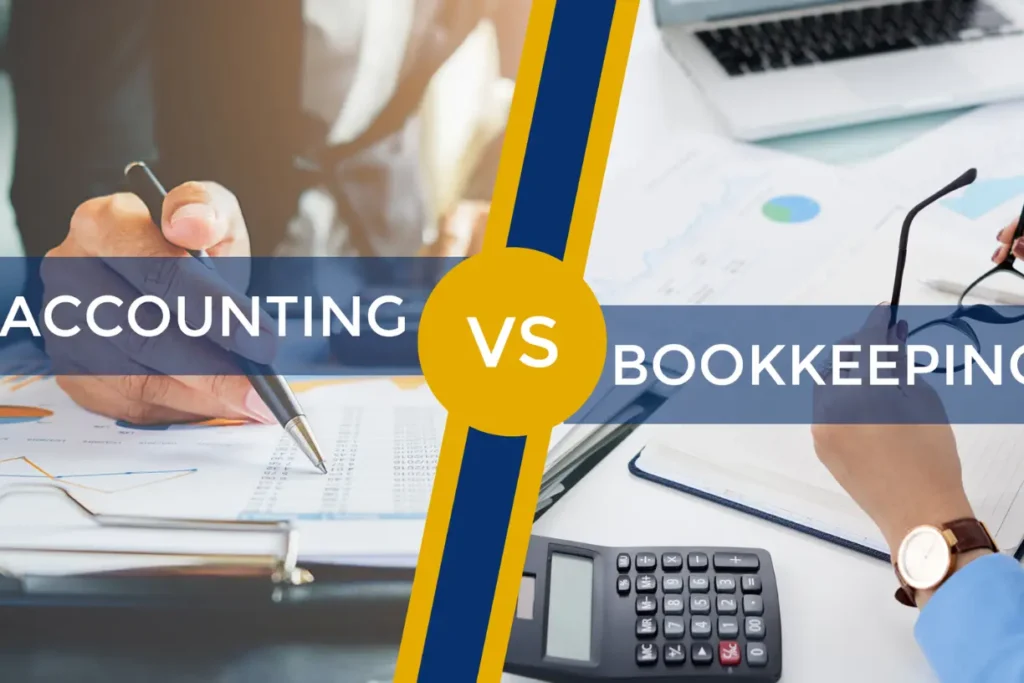Clear finances start with accurate records and smart analysis. Bookkeeping captures daily transactions. Accounting interprets those numbers to guide decisions, taxes, and growth. Chicago to Aurora, small teams scale faster when each role is defined and measured. Need expert help now? Button: Talk to Koffex Accounting
What each role does, in plain terms
Bookkeeping records sales, bills, payroll, and bank activity in ledgers and software. The output is clean, categorized data and reconciled balances. Accounting reviews that data to produce financial statements, forecasts, tax plans, and compliance files. The output is guidance leaders can act on with confidence.
Button: Set Up Accounting & Bookkeeping
Accounting vs bookkeeping at a glance
- Daily tasks
Bookkeeping posts transactions, matches bank feeds, sends invoices, and tracks receipts. Accounting compiles the P&L, balance sheet, and cash flow, then explains margin swings and cash gaps. - Timing and cadence
Bookkeeping runs daily and monthly closes. Accounting runs monthly reviews, quarterly estimates, and year-end reporting. - Skills and tools
Bookkeeping centers on categorization accuracy and controls in tools like QuickBooks or Xero. Accounting adds analysis, tax knowledge, budgeting, and audit readiness.
Why both matter for small businesses
Strong bookkeeping lowers errors, accelerates billing, and keeps audit support at hand. Accounting turns those accurate records into insights, such as pricing changes, hiring plans, and tax timing strategies. Together they protect cash and reveal growth paths that ad hoc spreadsheets miss.
Button: Get Your Free Books Review
Who to hire first and when to add the next
Most early-stage firms start with bookkeeping to keep data clean. Add accounting when monthly reports are late, lenders ask for statements, or tax planning gets complex. A combined service eliminates handoffs and reduces surprises at year-end.
Deeper comparison: accounting vs bookkeeping
- Purpose
Bookkeeping ensures every transaction is captured and coded. Accounting ensures those transactions tell a true story for decisions, taxes, and investors. - Compliance
Bookkeeping organizes receipts and reconciliations. Accounting files taxes, supports reviews, and manages standards that lenders accept. - Decision support
Bookkeeping confirms what happened. Accounting explains why it happened and what should happen next.
Common gaps to watch
Late reconciliations, uncategorized expenses, and missing receipts create unreliable reports. That leads to poor estimates and missed deductions. A monthly checklist, document rules, and review meetings close these gaps and keep leadership aligned.
Button: Build Your Monthly Close
How Koffex Accounting fits in
Koffex Accounting delivers daily accuracy and monthly insight in one place. Teams set a reporting calendar, define KPI dashboards, and keep tax-ready files year-round. Service scales from starter packages to full controller support as complexity grows.
Read More : bookkeeping mistakes made by businesses
FAQ: People Also Ask
What is the difference between bookkeeping and accounting?
Bookkeeping records daily transactions and reconciles accounts. Accounting analyzes that data to create financial statements, forecasts, and tax strategies.
Is bookkeeping the same as accounting?
No. Bookkeeping is transactional recordkeeping. Accounting is analytical reporting and guidance that uses those records.
What does a bookkeeper do versus an accountant?
A bookkeeper posts entries, manages invoices and bills, and keeps ledgers accurate. An accountant prepares statements, handles tax filings, budgets, and compliance.
Can a bookkeeper do accounting?
Some tasks overlap, but accounting requires deeper analysis and regulatory knowledge. Many firms pair a bookkeeper with an accountant for complete coverage.
Which should a small business hire first, a bookkeeper or an accountant?
Start with bookkeeping for clean data. Add accounting when decisions, lending, or taxes need structured analysis.
Do bookkeepers prepare tax returns or just record transactions?
Most bookkeepers focus on records and monthly closes. Licensed accountants typically manage returns and tax planning.
Clarity beats guesswork. Pair accurate records with expert analysis and watch decisions improve each month. Ready to combine both without hiring two teams? Button: Partner With Koffex Accounting







